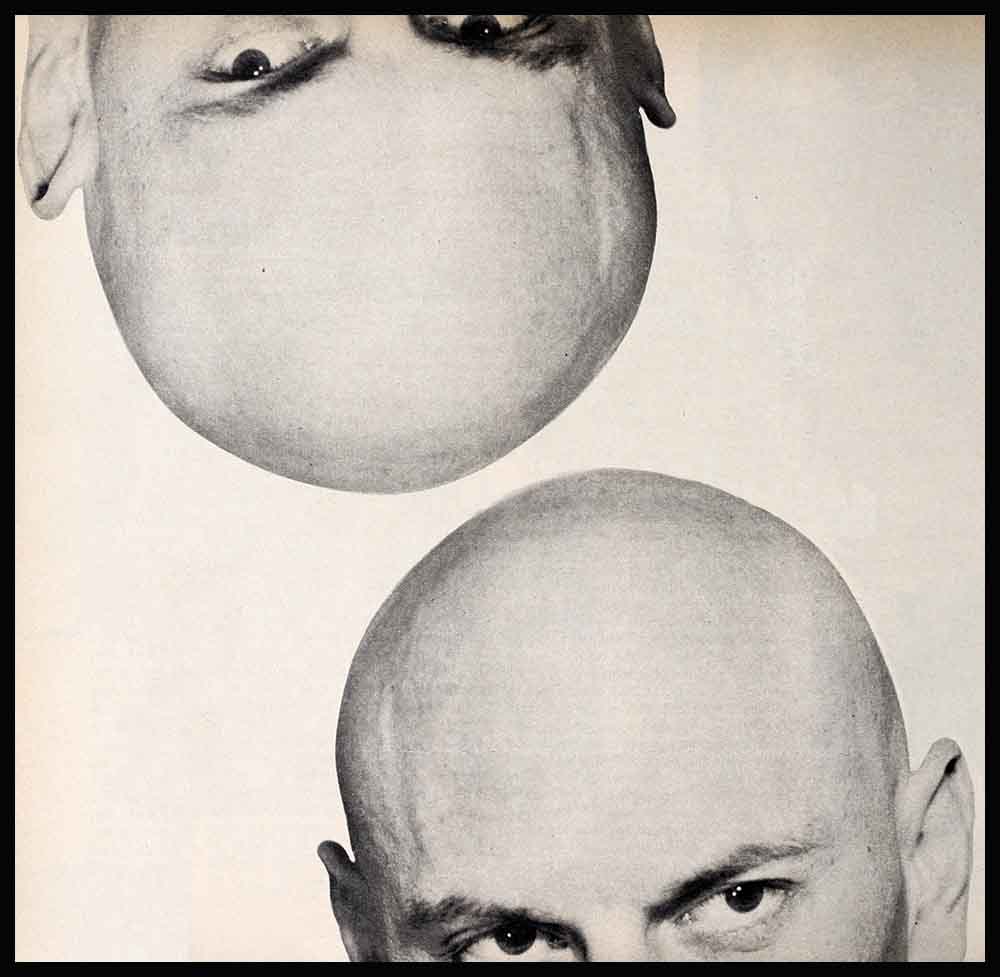
Who Needs Hair?
It is entirely possible that Yul Brynner, singlehandedly, might put the “You, too, can grow a head of hair like this” advertising men out of business. For just as Ezio Pinza proved that older men have their charms, Yul has proved that a lack of hair is no detriment to romance.
“Some men,” one of his young female admirers was heard to sigh, “don’t need hair—and he’s one of them.”
Yul’s bosses out at 20th Century-Fox and at Paramount are inclined to agree with the young lady, most wholeheartedly. Yul’s first major movie, “The King and I,” was no sooner released to the general public than the letters started pouring in. At first, no one could believe it. It wasn’t a genuine phenomenon, they decided, watching the bags of fan mail being carried in, it was a fluke. Time has proved them wrong. Letters are still pouring in—and along with the letters, compliments, proposals, love poems and gifts. Well-thatched executives and Yul’s equally well-thatched fellow stars are scratching their heads. Everyone knew that Yul Brynner was an actor of tremendous talent, but they never dreamed that a baldheaded man—any baldheaded man—could have and even exude sex appeal.
What was behind this unbelievable and overpowering attraction? Did Yul realize he had it? If so, to what did he attribute his appeal to movie-going American women? After all, let’s look at the record, people argued. Let’s see who have been the top favorites over the years. They’ve all been handsome, and they’ve all sported a fair head of hair: Rudolph Valentino, Tyrone Power, Robert Taylor, Cary Grant, Rock Hudson. And the ones who weren’t so well endowed, or whose locks began to thin come forty, all hied themselves nervously to the toupee artists.

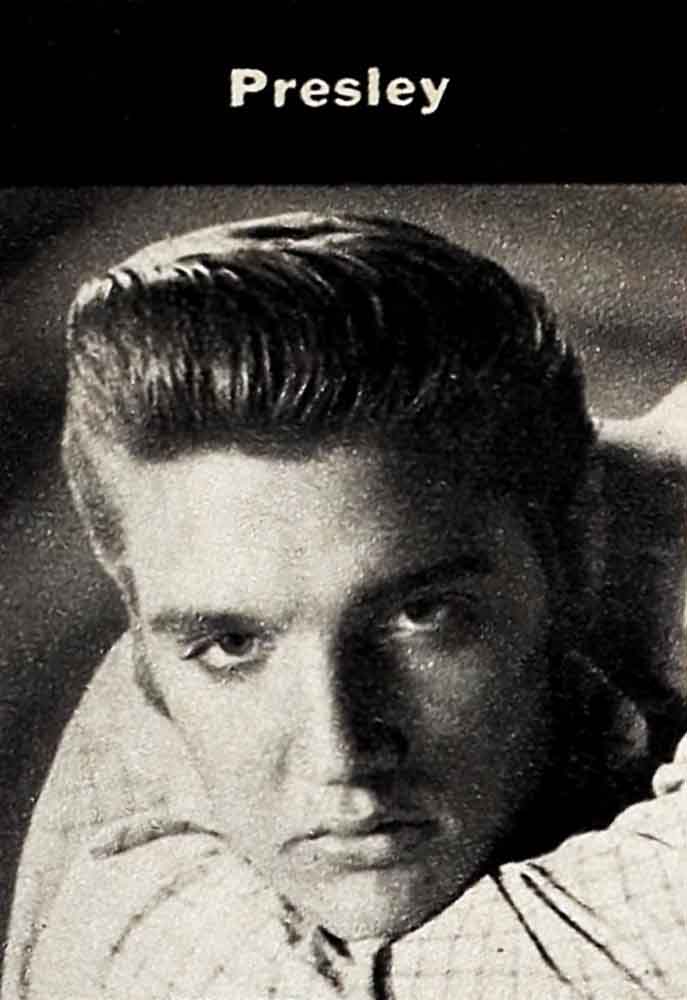
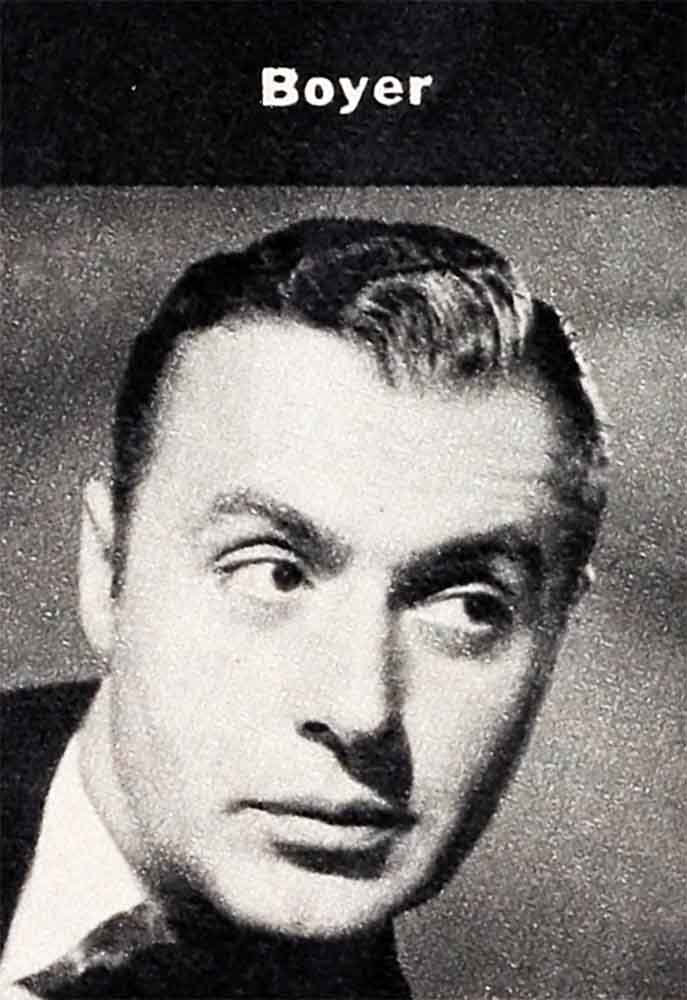
So what did Brynner have? What do the women who sigh over him think he has? The best way to find out was to ask, so we dropped around to Yul’s studio one day, pad and pencil in hand.
The first one we approached for an explanation of Yul’s appeal was an intelligent, well-paid studio employee. She and the other girls around the studio are accustomed to seeing stars all day, every day. But they’ve never seen one quite like Yul. We persuaded her to talk freely and frankly by promising to keep her identity a secret.
“The complete and utter fascination Yul Brynner has for most women can be summed up in just two words—animal magnetism,” this bright young lady said. “It’s a strange combination of almost brute strength and a subtly gentle tenderness. He takes complete command when he comes into a room. When he talks to a woman, he gives the impression that he is talking to her alone. He’s polite and considerate, yet he is completely dominating. He doesn’t look at you. He stares at you. It’s a strange experience. Those eyes of his seem to pierce you. Most women become almost transfixed, as if they were being hypnotized.
“His appeal is a physical appeal, but he’s certainly not handsome,” our informant went on. “His main attraction to the opposite sex is in his eyes. They are strong, yet tender. In addition is his superior, almost-but-not-quite-scornful attitude. Instead of offending a woman, as it would in any one else, in Yul it completely magnetizes her.”
Our friend paused and thought for a minute, and finally summed it up with: “Yul’s appeal to the feminine world is—let’s face it—S-E-X. Ask any girl what she thinks of him, and it comes out something like ‘grrr’. One thing you can be sure it is not, and that is maternal!”
The young lady who gave us this frank explanation is, as you might guess, unmarried. She is in her twenties. And now you know why she insisted on anonymity.
However, she is not alone. And apparently Yul’s appeal goes even beyond that. There is a tremendous admiration for him among his fellow workers, both female and male. This was well illustrated one day in the Paramount commissary.
Jerry Lewis is a Yul Brynner fan. On this day Jerry and his son, Gary, were in the commissary when Brynner came in. Jerry and Yul had never met.

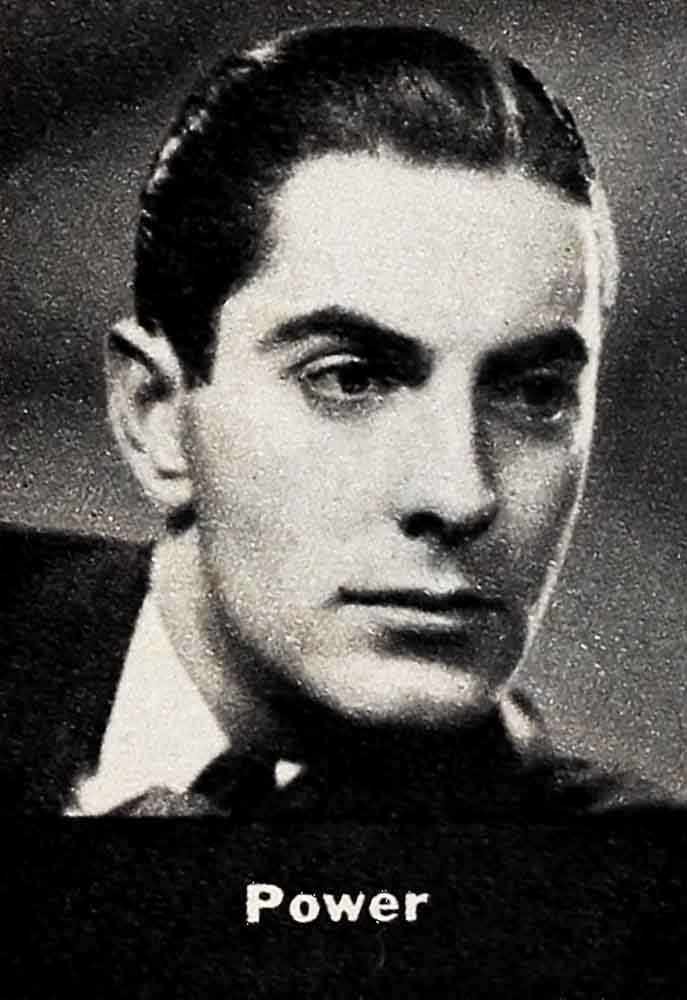
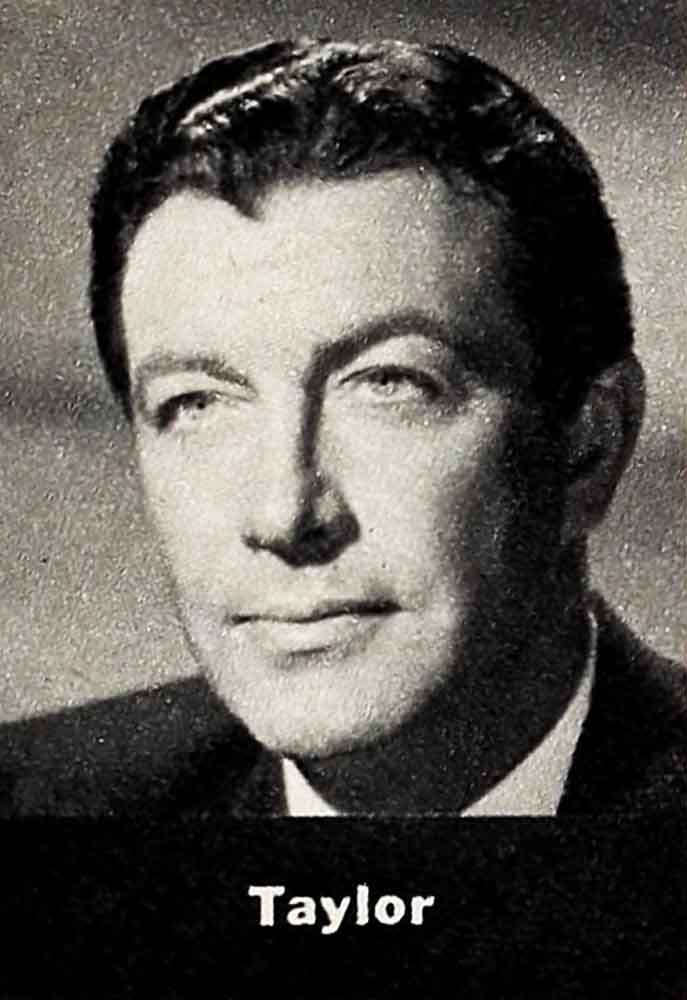
As soon as Yul was within handshaking distance, Jerry nudged son Gary, and both fell to their knees, bowing low like royal Siamese subjects. A gag? Sure it was, and it brought a terrific burst of laughter from the assembled Paramount workers as well as Yul himself. And when Yul laughs, off screen, that is, it is hearty, uncontrolled and honest.
“But you know something,” Jerry told us afterwards, keeping one eye on Brynner throughout his entire lunch, “Let’s face it. This man is the king.”
That wasn’t the first time such a comment has been made. One day, Yul’s sleek, low-slung sport car slowed down as it approached the school zone at Carmel, California. It was 3:30 and some of the high school gang were still sitting on the lawn.
“Hey, get a load of this job coming down the Street,” one of the guys said.
“What is it?” another one asked lazily. The car, with its two passengers, passed them, headed toward the ocean front.
“It’s a—Holy smoke, it’s the King,” one of the girls gasped. “I mean it’s him, it’s Brynner. It’s Yul Brynner!”
Yul, who was with his wife, the former Virginia Gilmore, grinned happily, and waved at his young admirers. While he is as surprised as his studio at the way he has caught the public fancy, he is also as pleased and delighted by it as they are.
This “king,” however, has had anything but a regal life. Not that he’s complaining, he told us later. But he has worked for his living ever since he was a twelve-year-old boy in France. And in case you’re wondering, he’s now 36, his birthday’s July 11, and he doesn’t try to bury the figure in interviews. His birthplace is the Russian area of Sakhalin, an island in the northern chain of Japan. His father, though Swiss, was of Mongolian descent. And his mother was a dark-eyed Romany gypsy beauty.
In the tradition of both sides of his family, Yul managed to be on the move almost all of his life. The Bryners, as it was then spelled, left the Far East for France when he was still a boy. He left school on his own at the age of twelve to become a part of show business, his talent being made known to the world first by means of his guitar playing and ballad singing. Recently, when Yul returned to Paris for the filming of “Anastasia,” he took Ingrid Bergman and producer Buddy Adler to some of the bistros where he used to entertain as a teenager. As a result, Adler decided to make use of Yul’s musical talents in the film.
Twenty years ago Yul Brynner’s name was well known in the cabaret Circuit of Paris. His reputation as a lady-killer was also well known. A lone wolf and a bachelor, Yul was never known to depend on restaurants for his dinners. A long list of the loveliest ladies of Paris was his to choose from any and every evening as they eagerly prepared their fanciest foods in the hope of sharing his fascinating company. They also hoped to trap him into matrimony, but no French girl ever succeeded. Years later, a California girl from the town of Del Monte became his wife.
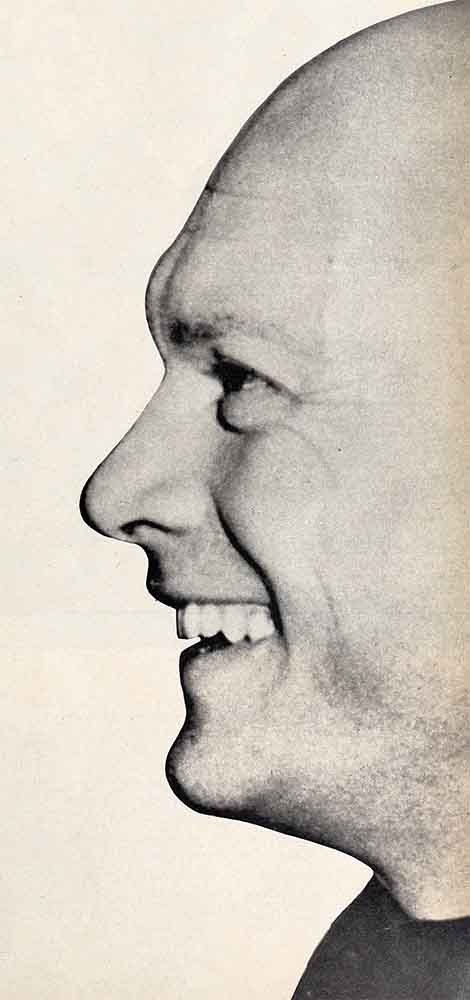
Brynner is taller than he seems in photographs. He measures six feet. His eyes are a sharp brown and his hair—if he ever lets it grow again—is a deep brown-black. Or at least used to be.
The teen-aged Yul enjoyed his carefree cabaret existence for several years, then graduated to circus performing and eventually to the legitimate theatre, which last whetted his appetite for a good education. As with everything he attacks, Yul pursued the education with a vengeance, ending with a degree from the Sorbonne.
He arrived in America in 1941. But, until his stage triumph in “The King and I” in 1952, few people knew of his existence, despite the fact he made one film, “Port of New York,” back in 1949.
Strangely enough, one of those few who had seen that film and remembered it— particularly Yul—was Debra Paget. Six years later, she was playing Lilia while he was Rameses in “The Ten Commandments.”
“Yes,” said Debbie, “how well I remember seeing him in ‘Port of New York’! Even then I was aware of his dominating magnetism. Of course, I didn’t really feel his great charm fully until I started to work with him. And I can tell you it sure is a powerful feeling. He seems to take over everything. When he walks on stage, or even in a room, you don’t watch anyone or anything else. Yet, despite this overpowering impact, he has a great deal of kindness in his eyes.”
Virginia Gilmore is one woman who appreciates both his impact and his tenderness, and has ever since they met. They’ve been married eleven years and have a son, Rocky, nine, who looks like his dad.
To understand Brynner’s completely un-actor-like approach to life, we must understand that his ambition is to be a director first, an actor second. Before plunging into the stage version of “The King and I” he had been a highly successful TV director, only occasionally stepping before the cameras himself.
However, he told us that he will continue to act as long as he can portray interesting characters. He will not act just for the sake of acting, and he will not be a leading man.
Yul Brynner, he of the amazing sex appeal, does not like love scenes. At least, not love scenes in the traditional screen manner. While he has played some of the sexiest and most different love scenes ever filmed in his three movies, “The King and I,” “Ten Commandments” and “Anastasia,” opposite Deborah Kerr, Anne Baxter and Ingrid Bergman, the average male in the audience probably didn’t realize the love scenes were even on screen. But ask any woman!
Yvonne de Carlo, for one, explains: “It’s not what he says but what he does. And also what he says with his eyes. He’s certainly not what I’d call a handsome man, but he has that unknown quality that makes you weak, that makes you want to run away from him.”
We decided that, armed with all this information on what makes Yul so irresistible to women, it was time to ask Yul himself. How did he feel about all this?
“Now that’s a dandy question,” he answered cheerfully, loving every word of it. “Because I can give you the answer in one sentence: I don’t play love scenes. Yes, the secret is in not doing them.”
There is no one who will deny that the “Shall We Dance?” number in “The King and I” is one of the sexiest scenes ever filmed, as well as being one of the most tender. By Yul’s reasoning it was so because it was accomplished without the usual methods.
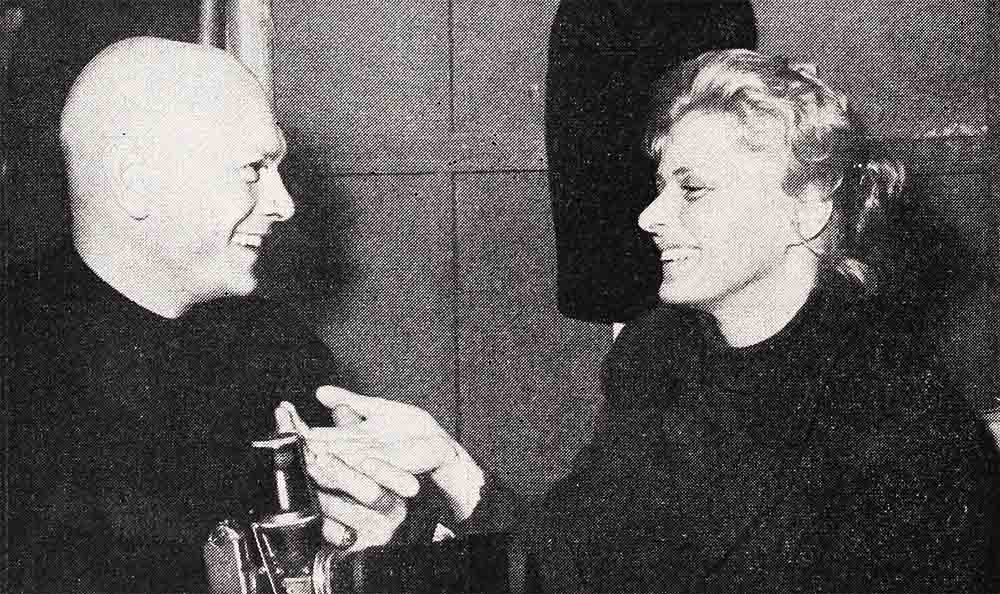
“When I reached out to ask Deborah to dance,” he explained, “that gesture, without any words or further action, should have explained the completeness of the desire.”
He repeated the motion by slowly extending his right arm to its full length, then turned the palm upward, with the fingers apart and the arm held rigid. Of course, a certain “look” went with it. And we agreed that his motion not only “should have” but did explain the desire. We saw what he meant. We also began to see what the women meant.
“This single, simple gesture,” he said earnestly, “conveys more than ten pages of dialogue.”
But how come no kiss at all?
“That,” explained Yul, “would have spoiled it. The impulse for the desire is the greatest. once it is fulfilled, that is the end of it. The impulse is the important thing. Besides which, it’s far more realistic.”
Similarly, in “Anastasia,” he has no direct love scenes with Ingrid Bergman. That is, there are no clinches. However, there is no doubt as to the bond of love between them. Unconsciously, or consciously, they love each other.
“It’s the whole attitude one must assume in playing a part. But that attitude, believe me, is not physical, but must come from within. In a way,” Yul went on, “I’m lucky. I never play myself. And I’d probably be scared to death if I did. I must have something to portray, a completely different character whom I can study and then deliver.”
He leaned back in his chair, put his arms behind his head, and seemed to think back for a minute. Then he bounced forward, leaned over and said: “Do you know something? In the four years I played ‘The King’ on stage, every time they gave me ‘thirty minutes to go’ I got nervous. And this happened every night!”
It never showed on stage, we noted.
“Aha,” he countered. “But that is the reason. Because when I stepped on stage, I was the king—and the king never gets nervous. I, as Yul Brynner, am limited in what I can do. However, my imagination isn’t. As a matter of fact, no one’s is. Imagination has no inhibitions.”
It is thanks to his imagination, says Yul, that he has been able to play dominating men, the King, Pharaoh, and General Bounine.
He plays all three roles, by the way, with a shaved head. But Yul doubts whether the startling appearance of a man with shaved head has anything to do with the attraction for the opposite sex. It is far from planned by him.
“I just try to play each role faithfully. My own personal enthusiasm about each character creates a certain amount of audience enthusiasm, I hope. But the shaved head is part of the realism in each role. The King of Siam and the Pharaoh were required to shave by tradition of their royal families. And the Russian regiment to which Bounine belongs always shaved, too.”
Before “The King and I,” Yul wore his hair in a very short crewcut, so it was not a shock for either Virginia or Rocky when he took razor in hand. And in case you wondered, he shaves his head when he shaves his beard each day. He just makes longer strokes with the razor!
Yul says he plans to keep his shaven head.
“Hair is just a prop,” he laughed, “like a uniform, or spear, to play different roles. Besides, I don’t think a man’s looks are important. What he thinks and what he does are what count. Combing hair is a lot of nonsense for a man. I can’t stand to see a man in front of a mirror, arranging his hair like a woman, putting a wave in it. Ugh!”
In “The Buccaneer,” in which he portrays Jean Lafitte, Yul will wear a wig and a moustache.
The burning question now is, Will Yul still be as attractive when he wears hair? Will he still look like a panther? Will his eyes have the same piercing quality when they peer out at you from beneath a wig of thick, dark tresses? Not since Hollywood was shaken by the great debate as to whether or not Marilyn Monroe meant it when she said she wanted to do “The Brothers Karamazov” has a controversy so rocked the studio commissaries.
Through it all, Yul remains calm. “I promise no love scenes,” he said, but with a kingly leer in our direction, “I do promise you lots of—what is that word again? Oh, yes—SEX.”
He sipped his mug of thick black coffee. His expression took on the distant look of the king who has closed his discussion and waits for the subject to depart. He had one final message, however.
“Remember,” he said, “there is no secret about love. In real life if a man wants to show his love, it is easy. He should be honest—that is all.”
We had one final question. We asked it wistfully. If there was no secret about love, then perhaps there was not, really, any secret about sex appeal. Perhaps it was something any man could cultivate, with time, patience, and a good razor.
Yul smiled. “That is, of course,” he said, “a secret.”
THE END
WATCH FOR: Yul Brynner in 20th Century-Fox’s “Anastasia.”
It is a quote. PHOTOPLAY MAGAZINE FEBRUARY 1957




